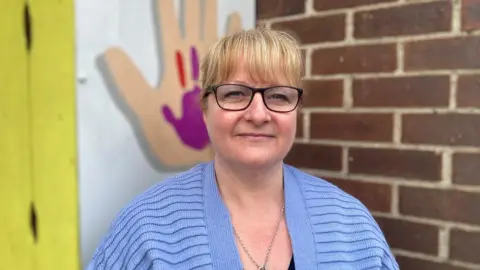Childcare sector needs urgent help, Employers for Childcare says
 Getty Images
Getty ImagesA childcare organisation has called for an urgent package of support to help a sector which they say is in crisis.
Employers for Childcare says many childcare providers are planning to raise fees by about 10% from April.
The company works on behalf of parents, employers and childcare providers.
It says rising energy bills, food costs, wages and business rates have created a perfect storm for day-care facilities.
BBC News NI has seen a number of letters addressed to parents from different settings outlining their price rises for the new financial year.
The social enterprise says there needs to be immediate support, similar to schemes rolled out during the Covid-19 pandemic.
Aoife Hamilton of Employers for Childcare told BBC News NI her team was speaking to parents who were asking themselves very difficult questions.
"They're asking themselves: 'Can I actually afford to stay in work after I have paid for the childcare I need to make that possible?'," she said.
"Many parents are reducing their hours, they're looking at what alternative arrangements they can put in place, or they're being forced to leave the workplace.
"Not only is that bad for families, but that's bad for economy and society as a whole."

The fee increase is expected to vary depending on where people live in Northern Ireland and what type of setting they are using.
Ms Hamilton spoke about one family who has contacted them recently.
"The mum is going back to work after maternity leave. She's had twins and has an older child," she said.
"They've been quoted £125 a day for a nursery place. Her take-home pay is £110 a day."

Marie-Claire's story
Marie-Claire has a 15-month-old daughter and works as a self-employed counsellor.
"I have her in three days a week. It used to be four, but we couldn't afford it," she says.
"We found out that from the start of April the cost will go up from £50 a day to £57. It was already a struggle.
"I love my job. But what's the incentive to work?"
She says the rising costs have meant both she and her husband have had to consider changing careers to find work that could help them reduce their reliance on childcare.
"I'm looking at taking her out of something she enjoys - something she benefits from. It is frustrating. I don't feel like I have any options," she adds.
"We are in this situation and we only have one child. I can't imagine having two or three and it will impact our decision about having more children in the future."

Ms Hamilton said financial help needed to come from both Stormont and Westminster.
"Some of the existing forms of financial support available for families are typically available across the UK and we think some of these schemes could be amended that would put additional funding and support into the pockets of families here in Northern Ireland to help them," she said.
 Getty Images
Getty ImagesMaria McDonagh owns a nursery in west Belfast and said she has told parents that her prices are likely to rise by 10%, but the costs of running her business are expected to rise by 10 to 15%.
"I am aware of some nurseries where managers aren't paying themselves and they are using life savings to pay the wages or contribute to the wage bill," she told BBC Radio Ulster's Good Morning Ulster programme.
"That can't keep going. That's a nursery two or three months away from closing.
"It's just escalated to the point where we know it is not sustainable anymore for either ourselves or for parents."

She added: "I have 98 children registered with me. That's 98 families who can go to work, whether a mum or dad, or both.
"For me to close my setting, those 98 families are in a position where they can't go to work."
There have been a number of delays to the development of a childcare strategy which has been promised for a number of years, most recently in the New Decade New Approach agreement.
"What we need is an executive in place so that decisions can be made and the funding released that actually puts promises into pounds and into providers pockets and into families," said Ms Hamilton.
In a statement, the Department of Education said affordability of childcare was a key factor being considered in the ongoing work to develop an early learning and childcare strategy.
"In the meantime, the department is working with others to ensure that parents are aware of the financial support already available to help with their childcare costs," a spokesperson said, citing the UK-wide Tax-Free Childcare Scheme and the production of an Employers Guide to Childcare.
"In parallel, the Department of Health, which has statutory responsibility for regulation and inspection of childcare services is considering the regulatory framework to determine whether any changes can be made to potentially reduce some of the pressures experienced by childcare providers," they added.
